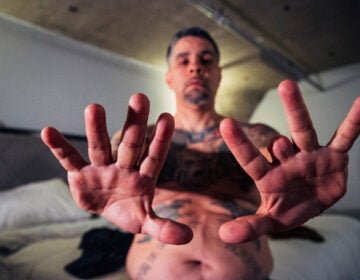Incarcerated instead of in treatment
A Bucks woman's experience shows incarceration can make mental illness worse — and that a Pa. law meant to help people instead of putting them behind bars isn't working.
Listen 14:55
In this June 2019 photo, Martha Stringer holds a photo of her daughter, Kim. (Brett Sholtis / Transforming Health)
WITF health reporter Brett Sholtis was wrapping up work on a Friday night when he got a collect call from the Bucks County jail. The caller was worried about how corrections officers were treating another woman incarcerated with her named Kim Stringer.
Kim lives with serious mental illness, and Brett wrote a story last year about her family’s struggle to get her help. Since then, Kim was arrested. She’d repeatedly tried to hurt herself in jail, and corrections officers responded with force: macing her, forcing her into a restraint chair and leaving her in an empty cell where she sat, naked, in her own excrement.
Nationwide, 20% of people in jails have a mental health condition — which means there are a lot of people like Kim, who end up incarcerated instead of in treatment. Brett explains why this happens, and why a Pennsylvania law meant to fix the problem hasn’t made a difference.

Hear the whole story on The Why
Interview Highlights
On why Kim was taken to a jail instead of a hospital
I spoke to Bucks County District Attorney Matt Weintraub about this, and he said it was a matter of there not being enough resources. But the problem also has to do with the way the system is set up in Pennsylvania. A person with a mental illness who doesn’t want treatment can’t really be forced to get treatment unless they’re deemed to be a threat to themselves or others. And this is something that’s designed to protect people from being committed or institutionalized unfairly. But one effect of it is that it also often means that a person with mental illness is only getting treatment after or during a time when they’ve been arrested for some crime and possibly put in jail.
On the law that could direct people with mental illness to treatment earlier — but doesn’t
In 2018, the state Legislature passed a law that would allow for something called assisted outpatient treatment. It was signed by the governor and everything. So assisted outpatient treatment would allow a team to work with a judge and the person who is averse to treatment and it would change the standard for involuntary commitment. So for that, instead of proving that a person has to be a danger to themselves or others, you only have to show that they’re in urgent need of care and that they’re unequipped or unable to take care of themselves and that this is having a detrimental effect on them. That can’t lead them to any type of jail time or commitment in an institution. But what it can do is get that person help in a way that’s completely divorced from the criminal justice system and completely removed from police.
So the law exists and is on the books, but the mental health programs are actually administered by the counties and none of the counties have made any effort to use this program. And it’s possible that some counties are are seeking more funding before they implement any more programs. And look, I get that because [mental health] funding has been completely flat in Pennsylvania for a long time and … eight years ago was decreased by $84 million a year. So I think the counties are stretched pretty thin when it comes to funding.
John Snook, director of the Treatment Advocacy Center in Virginia, on putting people with mental illness in jail
If you started with “What just doesn’t work? What’s the worst way we could do this, to provide someone [with mental illness] care?” it would be a jail. What we know is that when someone with a mental illness goes into a jail, they’re very much less likely to get the treatment they need. We did a survey a few years ago with sheriffs all over the country and sheriffs said this plainly. They said we don’t have enough training, we don’t have enough resources for people with mental illness and the reality is what happened is a person is much more likely to come out of jail sicker than when they went in.
WHYY is your source for fact-based, in-depth journalism and information. As a nonprofit organization, we rely on financial support from readers like you. Please give today.






